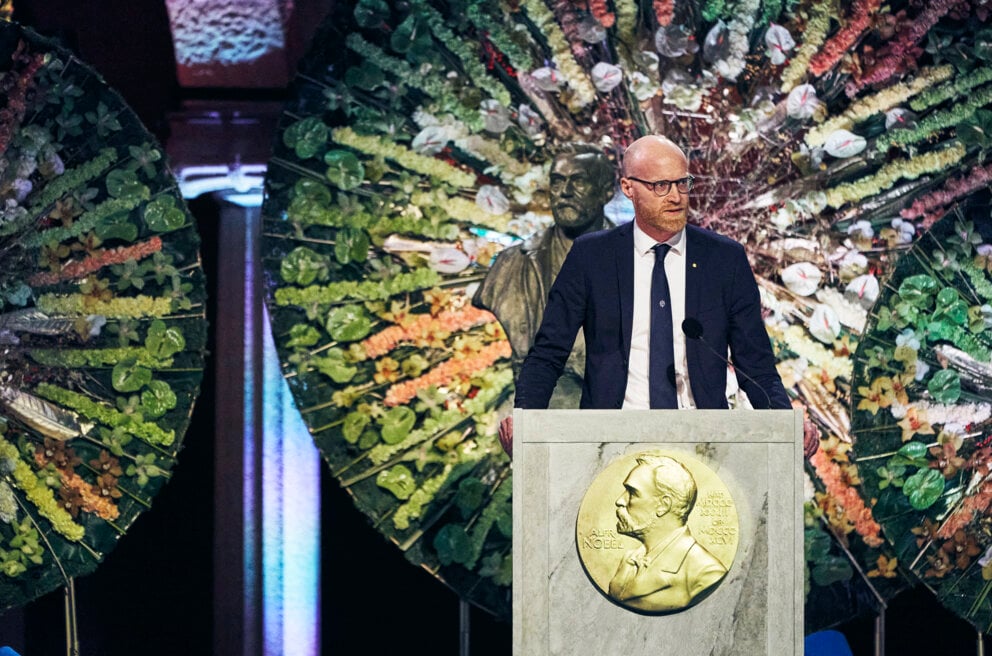Award ceremony speech

Professor Peter Fredriksson delivering the presentation speech for the 2021 prize in economic sciences.
© Nobel Prize Outreach, photo: Dan Lepp
English
Swedish
Presentation Speech by Professor Peter Fredriksson, Member of the Royal Swedish Academy of Sciences, Chair of the Committee for the Prize in Economic Sciences in Memory of Alfred Nobel, 10 december 2021.
Your Majesties. Your Royal Highnesses. Esteemed Nobel Laureates. Ladies and Gentlemen.
As social scientists, we frequently face important questions that seem very difficult to answer. One of these surfaced during the current pandemic: What is the impact of school closures on the spread of the COVID-19 virus? In most countries, this question is almost impossible to answer. Since all schools closed at the same time, we simply do not know what would have happened had they not done so.
But following the work of this year’s Laureates, Swedish researchers recently devised a way to answer the question. The Swedish setting in fact provides a natural experiment: Upper secondary schools moved to online teaching while lower secondary schools remained open. We can thus compare the spread of the infection in open schools with similar schools that were closed at the same point in time. The researchers have shown that school closures reduced reported infection rates among teachers by 50 percent, and that there was also a decrease – albeit smaller – among parents. School closures also reduced the spread of the virus to elderly homes.
A similar research strategy could be used to examine the other side of the coin – that is, how school closures affected student learning. But we will have to await the arrival of reliable data before we can answer this question.
As the example illustrates, natural experiments are unintended experiments that occur without the interference of researchers. Such events can arise from administrative rules, variations in policy, or naturally occurring random variation. They allow researchers to compare affected and unaffected groups in a way that mimics the comparison of treatment and control groups in clinical trials.
The systematic use of natural experiments started among labor economists some 30 years ago. In the early 1990s, David Card set out to analyze the labor market effects of the minimum wage, immigration, and education policy. His studies broke the mold of existing empirical practice and the results challenged conventional wisdom. This stimulated additional research, to which Card remained a core contributor. Thanks to this work, we have gained a much deeper understanding of labor markets. We now know, for example, that raising the minimum wage has only a small negative employment impact in most settings, and that educational policies can affect inequality in the labor market to a greater extent than was previously thought.
Data from natural experiments are more difficult to interpret than data from controlled clinical trials. To illustrate why, suppose you extend compulsory education by a year in some regions but not in others. Such a policy change does not affect all students in the same way. Some students would have kept studying anyway and, for them, the value of education is often not representative of the entire group. What can we conclude about the effect of prolonging compulsory education in such a scenario?
Joshua Angrist and Guido Imbens showed that it is still possible to estimate a well-defined effect of such an intervention. Their framework has improved our ability to establish causal effects and interpret the results, and it has been widely adopted in applied research.
Dear Professors Card, Angrist, and Imbens:
You have shown that important questions for society can be answered using natural experiments. Your research has given us new insights about the labor market and you have clarified what conclusions about cause and effect can be drawn from natural experiments. Together, you have revolutionized empirical work in the economic sciences. Thanks to your research, our ability to answer causal questions of great importance to us all has improved tremendously.
It is an honor and a privilege to convey to you, on behalf of the Royal Swedish Academy of Sciences, our warmest congratulations.
Copyright © The Nobel Foundation 2021
Nobel Prizes and laureates
Six prizes were awarded for achievements that have conferred the greatest benefit to humankind. The 12 laureates' work and discoveries range from proteins' structures and machine learning to fighting for a world free of nuclear weapons.
See them all presented here.
